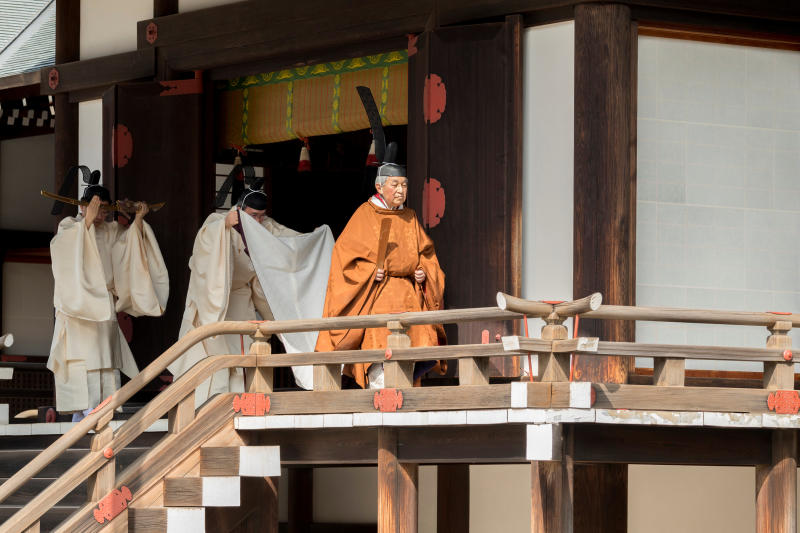Japan sets ball rolling on Emperor Akihito's abdication
Sign up now: Get insights on Asia's fast-moving developments

Japan's Emperor Akihito walks for a ritual at the Imperial Palace in Tokyo, Japan on March 12, 2019.
PHOTO: REUTERS
TOKYO (YOMIURI SHIMBUN/ASIA NEWS NETWORK) - Japan on Tuesday (March 12) kicked off a series of elaborate ceremonies leading up to Emperor Akihito's abdication on April 30, the first such event in nearly two centuries.
The 85-year-old monarch, in formal court dress traditionally worn by emperors, appeared at a sanctuary within the Imperial Palace grounds in Tokyo to take part in a ritual in which he announced his abdication to ancestors and deities.
The sanctuary, called Kashikodokoro, houses a building where the goddess Amaterasu Omikami, the Imperial family's ancestral deity, is worshipped.
Holding a ritual sceptre in his hands, Emperor Akihito made his way slowly around a cloister, before going behind a bamboo blind.
According to the Imperial Household Agency, the octogenarian Emperor read out a statement in classical Japanese that on April 30 he will abdicate the throne he has held since 1989. He will be succeeded by Crown Prince Naruhito the following day.
The Emperor then visited and bowed at the other sanctuary buildings: the Koreiden, enshrining successive emperors and Imperial families, and the Shinden, enshrining deities. His ailing wife, Empress Michiko, offered prayers at her residence.
Among the places the Emperor will visit to announce his abdication to ancestors will be the tomb of legendary Emperor Jimmu in Kashihara, Nara Prefecture, on March 26 and the shrines of Ise Jingu in Ise, Mie Prefecture, on April 18.
Akihito shocked the country in 2016 when he signalled his desire to take a back seat, citing his age and health problems.
Japan's Constitution defines the emperor as a symbol of the state and the people, without political power. His duties include Shinto religious ceremonies and constitutionally-defined tasks, such as the opening of Parliament.
Emperor Akihito's 30-year reign has also been marked by travels to domestic disaster sites to cheer survivors, and overseas to soothe the wounds of a war fought in the name of his father, Emperor Hirohito, who was considered divine until Japan's defeat in World War II.


